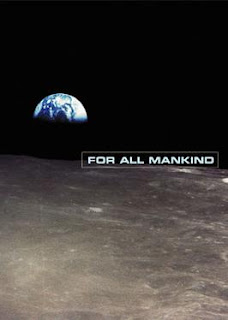For All Mankind
This year is the fiftieth anniversary of the first moon landing, and there is a documentary out called Apollo 11. But For All Mankind, a documentary about all nine manned trips to the moon, was released in 1989 and was nominated for an Academy Award.
The film came from six million feet of unreleased footage in NASA's archives. Director Al Reinert and his editor, Susan Korda, sifted through all this to make an eighty-minute film. Reinert had been interviewing astronauts for several years, and their voices are heard as we see a typical trip to the moon and back, accompanied by music composed by Brian Eno.
Though someone of my age has lived with the Apollo program almost their whole life, it was still gripping to watch, especially the liftoff, which is cut in such a thrilling manner. The fireball beneath the rocket, and the snapping of the attachments to the rocket as if leaves the launchpad is mesmerizing.
One thing that I found disconcerting was that nothing was identified. All of the manned missions are incorporated, and thus unless you are an expert you won't know which mission you're watching. The narrators are not identified either, unless you are watching with subtitles. At times there is a specificity to the scenes, such as when Pete Conrad is taking the lunar rover for a spin. But as to the many shots of flight director Gene Kranz staring at monitors, we don't know what point in time that was.
For All Mankind is really about the visuals. The Earth rising over the moon is an image we can't really get tired of--and these men couldn't, either, as they realized they were the only humans alive who were not currently on the Earth. There are some scenes of them listening to music--Buck Owens and Merle Haggard contributed music for their cassette player.
No one has been on the moon since December, 1972. Of course we've had Skylab and the space shuttles since then, but cuts to NASA and a general anti-science attitude by this administration have succeeded in the public losing their imagination for space travel. Mars represents the next opportunity, but maybe there's more to be done on the moon, now that technology is so much greater. Watching films like these remind us of how humans, particularly Americans, can get things done if they really want to.
The film came from six million feet of unreleased footage in NASA's archives. Director Al Reinert and his editor, Susan Korda, sifted through all this to make an eighty-minute film. Reinert had been interviewing astronauts for several years, and their voices are heard as we see a typical trip to the moon and back, accompanied by music composed by Brian Eno.
Though someone of my age has lived with the Apollo program almost their whole life, it was still gripping to watch, especially the liftoff, which is cut in such a thrilling manner. The fireball beneath the rocket, and the snapping of the attachments to the rocket as if leaves the launchpad is mesmerizing.
One thing that I found disconcerting was that nothing was identified. All of the manned missions are incorporated, and thus unless you are an expert you won't know which mission you're watching. The narrators are not identified either, unless you are watching with subtitles. At times there is a specificity to the scenes, such as when Pete Conrad is taking the lunar rover for a spin. But as to the many shots of flight director Gene Kranz staring at monitors, we don't know what point in time that was.
For All Mankind is really about the visuals. The Earth rising over the moon is an image we can't really get tired of--and these men couldn't, either, as they realized they were the only humans alive who were not currently on the Earth. There are some scenes of them listening to music--Buck Owens and Merle Haggard contributed music for their cassette player.
No one has been on the moon since December, 1972. Of course we've had Skylab and the space shuttles since then, but cuts to NASA and a general anti-science attitude by this administration have succeeded in the public losing their imagination for space travel. Mars represents the next opportunity, but maybe there's more to be done on the moon, now that technology is so much greater. Watching films like these remind us of how humans, particularly Americans, can get things done if they really want to.



Comments
Post a Comment